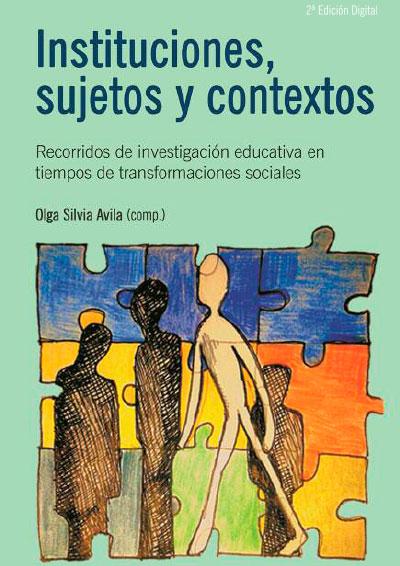Institutions, subjects, and contexts: educational research paths in times of social transformation.
Keywords:
educational institutions, educational policies, educational research, Córdoba (Argentina), education and social change, primary school - social aspects, secondary school - social aspects, educational inclusion, education and social inequality, childhood - education, adolescence - education, subjectivity and school, diversity and disability - school integration, community education, teacher training, pedagogical innovation, education - sociological aspectsSynopsis
This volume compiles the work carried out within the framework of the project: “Institutions, subjects, and social transformations. Critical intersections and instituting processes in the education of children and young people,” subsidized by Secyt-UNC and based at the “María Saleme de Burnichón” Research Center of the UNC Faculty of Philosophy and Humanities.
The project brings together the work carried out by the team in recent years and focuses on the study of institutions, subjects, and social transformations, proposing an articulated view of the school as an institution constituted from collective practices, the experiences of childhood/adolescence in their pluralities and heterogeneities, and recent processes in urban contexts. Taking into account the socio-historical configuration of local spaces, the aim was to analyze institutional developments and transformations within these networks, the place of subjects and the subjective elaborations coined in these plots, as well as the constructions of childhood/adolescence in community organizations and their school articulations.
It is worth noting that this first effort to produce a publication based on educational research—which has already been discussed with fellow researchers at various scientific events—aims to go beyond academic boundaries and strengthen the dialogue already initiated through various proposals with teachers, administrators, professionals in the system, teacher training students, members of organizations concerned with education, and all those interested in sharing and comparing perspectives and questions in the field of issues addressed in these pages.
Chapters
-
Presentation
-
I. Subjects, schools, and contexts
-
Worlds of childhood/adolescence. Conditions, intersections, and interventions in the social production of educational experience
-
Where do I put what I have found? Teachers' interpretations of common educational issues in childhood today
-
Social relationships and everyday conflict in sixth grade. An approach from the children's point of view
-
Subjectivity and school. Adult perspectives and ways of being for boys and girls at school
-
Schools, diversity, and disability. Some developments and new challenges in school integration
-
2. Processes and tensions in the fabric of schooling
-
Equality and educationsubjects, institutions, and practices in times of social transformation
-
Secondary school, compulsory education, and the challenges of diversity
-
Breakdowns and critical points in the early years of secondary school
-
Secondary school, institutional processes, and collective positions in times of transformation
-
Build an “educational pathway” that enables the transition to secondary education.
-
3. Childhood, education, and community
-
Childhood experiences in community educational spaces. Other possible modes of intervention
-
Living in communityperspectives on experiences with children in educational settings
-
School support. Findings from research and reflections on supporting the schooling of children and adolescents
-
Social transformations, childhood, and schooling. Thinking about childhood together with teachers in a town in the province of Córdoba
-
Institutional practices in the face of the challenges of educational inclusion in contexts of urban poverty
-
Community Teachersworking with families in their everyday context
-
The game of otherness. The construction of subjective and school experiences in childhood
-
The authors

Downloads
Published
Categories
License

This work is licensed under a Creative Commons Attribution-NonCommercial-ShareAlike 4.0 International License.


